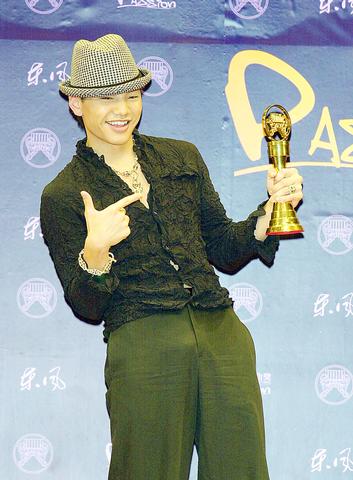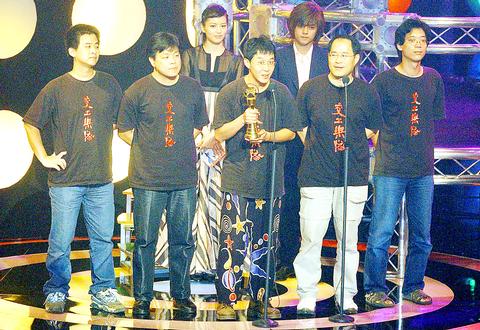Call it a one-man show. Only these words capture how completely Jay Chou (
There was little surprise in Jay winning four awards, including the coveted Best Album. After all, either he or his album were nominated in all seven categories that could possibly apply to him, and in one category his album was nominated three times, giving him a total of 10 shots at a prize.

PHOTO: TAIPEI TIMES
In addition to Best Album, Chou also picked up Best Songwriter and Best Producer, and Vincent Fang(

PHOTO: TAIPEI TIMES
The annual Golden Melody Awards, held in Kaohsiung for the second year running, is the biggest event of its kind to recognize the year's highest achievers in the Chinese-language music industry. The event is typically seen as a chance for the industry's divas to show up in outrageous costumes and dazzle the teenyboppers that show up to scream at them. While female glam and glitz was certainly not in short supply, the 21-year-old former music student Chou stole much of the limelight from the female stars.
It is generally accepted that female singers outsell their male counterparts by two-to-one in the Mando-pop arena. But the last year has been an unusual one in a number of ways, and these were apparent at the show. This year's award ceremony was an obvious attempt to put a festive face on a deeply troubled industry.

PHOTO: TAIPEI TIMES
Sales of Mando-pop releases have plummeted in the last year, with some blaming the economy but others pointing to a host of internal problems such as high marketing costs, label over-expansion and a perceived lack of creative releases. That didn't stop thousands of dedicated fans from waiting outside the Kaohsiung Chiang Kai-shek Cultural Center in the blazing sun through the afternoon to see the arrival of the stars. People started to line up outside the venue the previous night to get an up-close view of the stars. It was estimated that there were around 3,000 people on the scene.
Ironically, one of the most anticipated arrivals were the four members of the group F4, who were not nominated in the awards at all. "I don't care about the rest, I just want to see F4, and maybe A-mei too," said Li Huei-tse, one of the predominately female crowd outside the venue.
The arrival formalities established one of the themes that ran through the ceremony, namely that of Taiwan's rampant CD piracy, that some artists see as a major cause of the music industry's poor performance. Taotse (
Struggling for a piece of the limelight were the other male artists like William So (蘇永康), Sky Wu (伍思凱) and Lee Hom Wang (王力宏). But these artists were completely shut out by their rival Chou. Harlem Yu (庾澄慶), who picked up Best Male Singer, was something of a dark horse, especially as he was in a crowded category and facing the evening's megastar Chou.
Backstage, Yu was all choked up and wanted nothing more than to tell the good news to his wife by phone.
Chou, who seemed unmoved my much of the excitement that surrounded him throughout the evening, said that if he had not won the Best Producer, he would have stopped producing altogether. This was in response to a question regarding which of his four awards he regarded as the most important. Chou's self-produced Fantasy album, which was released in September last year, is estimated to have sold over 300,000 copies and has received an award from the IFPI, an international music industry organization, for its outstanding sales record.
The awards for the women were much more evenly distributed among the industry's stable of female divas. A-Mei picked up the award for Best Female Singer having been nominated on four previous occasions without getting an award. "On the last four occasions, I always felt that getting a nomination was enough, but winning this time, it was just incredible," she said backstage.
Sun Yanzi (
Judy Chiang (
Two of the few surprise winners were Labor Exchange (
"I owe all of my inspiration to my grandma," Biung said during an emotional acceptance speech. Biung is the first Aboriginal to win in this category. Backstage, Biung was totally overjoyed with his award and participated in lots of banter with the press. He said he did not want to overemphasize the Aboriginal angle but was delighted that "it was important for the music industry that it wasn't a Taiwanese-language artist who won" the award on this occasion.
The Aboriginal theme was nevertheless emphasized at the ceremony with an honorary award for recently deceased Ami tribe singer Difang (
On stage, Hakka folk-rock band Labor Exchange spoke about the influence of Chinese rocker Cui Jian (
The Golden Melodies have been good to Labor Exchange, who gained wide recognition after picking up two awards in traditional music categories in 2000. The move into the Best Band category is a major shift for them and is indicative of their broader appeal. Even so, Lin Sheng-hsiang (
As to the Best New Artist to come on the scene this year, the Golden Melodies gave the nod to Jeffrey Kong (
Best Album
Fantasy (周杰倫范特西), Jay Chou (周杰倫)
Best Pop Instrumental Album
Moonlight Frontier (月光邊境), Lin Hai (林海)
Best Video
Fleeting Time (流年) from Fleeting Time (流年) by Faye Wong (王菲)
Best Songwriter
Jay Chou (周杰倫) for Ai Cai Hsi Yuan Chian (愛在西元前) from Fantasy (周杰倫范特西)
Best Lyricist
Vincent Fang(方文山) for Wei Lian Ku Pao (威廉故堡) from Fantasy (周杰倫范特西)
Best Arrangement
Tung Hsing-min (鍾興民) for Shuang Jie Kun (雙截棍) from Fantasy (周杰倫范特西)
Best Producer
Jay Chou (周杰倫) for Fantasy (周杰倫范特西)
Best Mandarin Male Singer
Harlem Yu (庾澄慶), Tidal Wave (海嘯)
Best Non-Mandarin Male Singer
Biung (王宏恩) for Biung (王宏恩)
Best Madarin Female Singer
A-Mei (張惠妹), Truth (真實)
Best Non-Mandarin Female Singer
Jody Chiang (江蕙), Jody Chiang (江蕙)
Best Band
Labor Exchange (交工樂隊), The Night March of the Chrysanthemums (菊花夜行軍)
Best New Artist
Jeffrey Kong (孔令奇), 01

May 18 to May 24 Pastor Yang Hsu’s (楊煦) congregation was shocked upon seeing the land he chose to build his orphanage. It was surrounded by mountains on three sides, and the only way to access it was to cross a river by foot. The soil was poor due to runoff, and large rocks strewn across the plot prevented much from growing. In addition, there was no running water or electricity. But it was all Yang could afford. He and his Indigenous Atayal wife Lin Feng-ying (林鳳英) had already been caring for 24 orphans in their home, and they were in

President William Lai (賴清德) yesterday delivered an address marking the first anniversary of his presidency. In the speech, Lai affirmed Taiwan’s global role in technology, trade and security. He announced economic and national security initiatives, and emphasized democratic values and cross-party cooperation. The following is the full text of his speech: Yesterday, outside of Beida Elementary School in New Taipei City’s Sanxia District (三峽), there was a major traffic accident that, sadly, claimed several lives and resulted in multiple injuries. The Executive Yuan immediately formed a task force, and last night I personally visited the victims in hospital. Central government agencies and the

Australia’s ABC last week published a piece on the recall campaign. The article emphasized the divisions in Taiwanese society and blamed the recall for worsening them. It quotes a supporter of the Taiwan People’s Party (TPP) as saying “I’m 43 years old, born and raised here, and I’ve never seen the country this divided in my entire life.” Apparently, as an adult, she slept through the post-election violence in 2000 and 2004 by the Chinese Nationalist Party (KMT), the veiled coup threats by the military when Chen Shui-bian (陳水扁) became president, the 2006 Red Shirt protests against him ginned up by

As with most of northern Thailand’s Chinese Nationalist Party (KMT) settlements, the village of Arunothai was only given a Thai name once the Thai government began in the 1970s to assert control over the border region and initiate a decades-long process of political integration. The village’s original name, bestowed by its Yunnanese founders when they first settled the valley in the late 1960s, was a Chinese name, Dagudi (大谷地), which literally translates as “a place for threshing rice.” At that time, these village founders did not know how permanent their settlement would be. Most of Arunothai’s first generation were soldiers